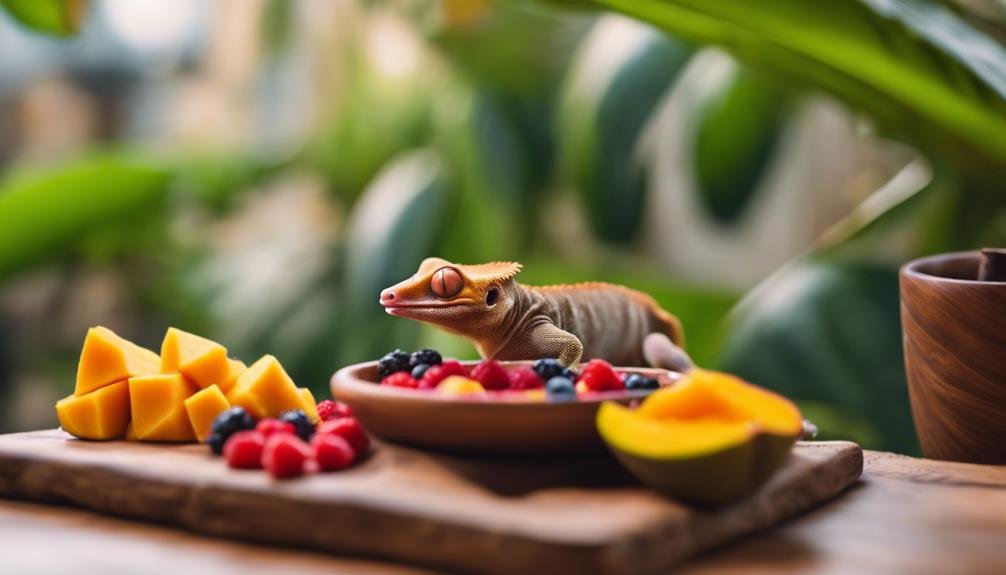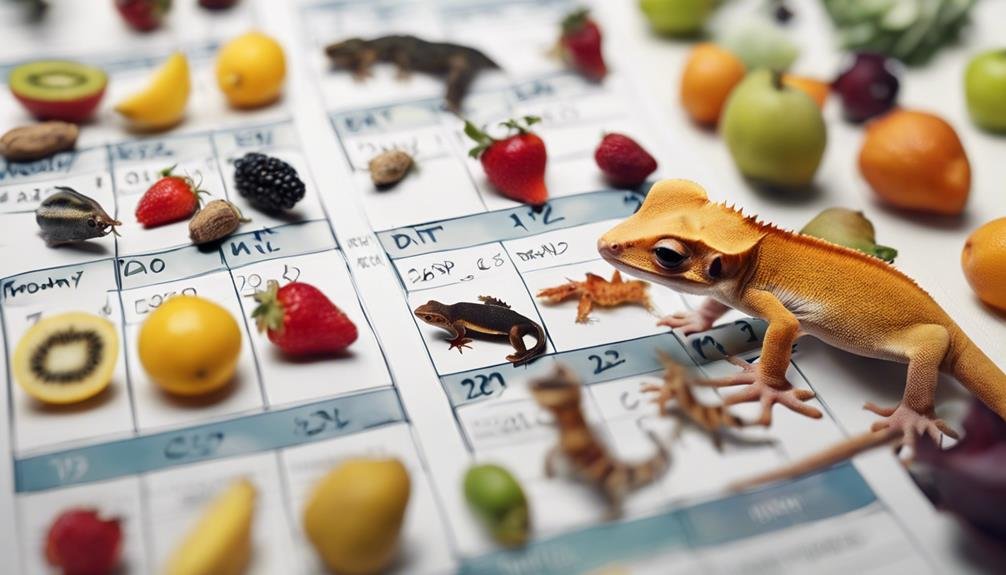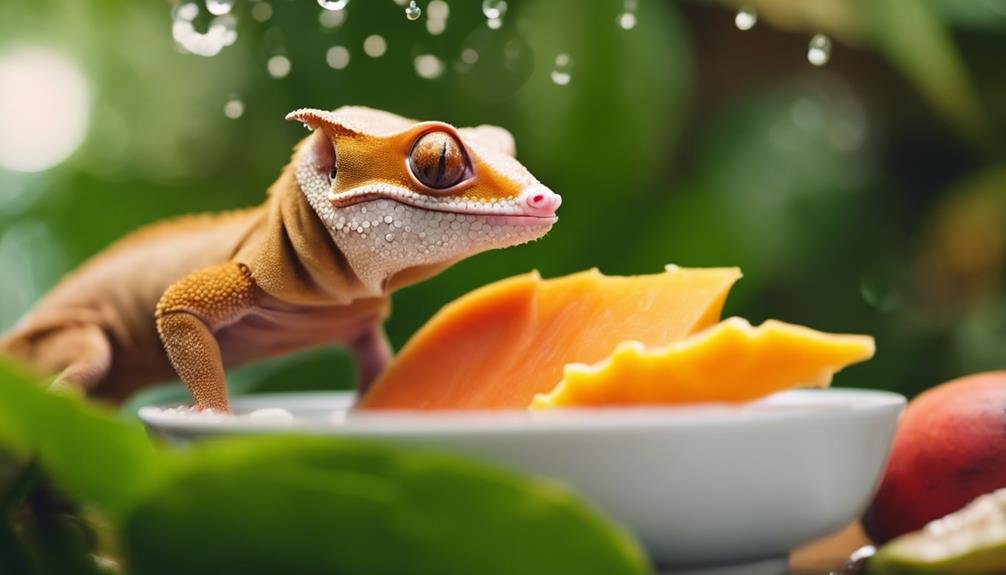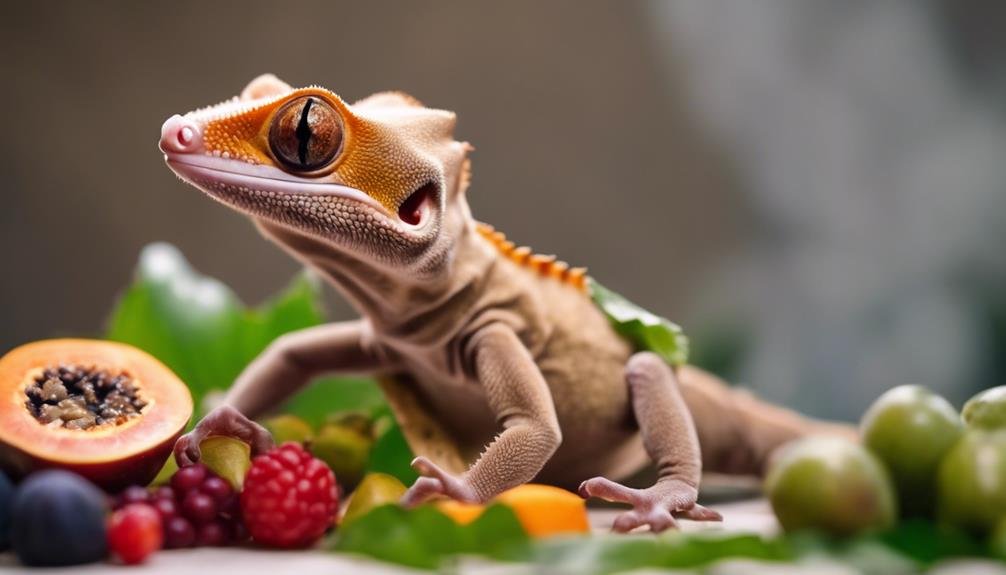If you're a crested gecko owner, you already know these little creatures have specific dietary needs that mimic their natural habitat. From nocturnal insects to the occasional sweet treat of fruit, ensuring your gecko's diet is both varied and nutritious is key to their health. But with so many options, from live feeder insects to fruit treats and premix powders, it's easy to feel overwhelmed. What's the right balance? And how can you be sure you're not missing something essential for their well-being? Stick around, and you'll discover some insightful tips on crafting the perfect diet for your crested gecko, keeping them healthy and happy.
Key Takeaways
- Crested geckos primarily consume nocturnal insects, fruit, and flower nectar in the wild.
- Live foods like crickets, silkworms, and wax-worms are preferred feeder insects.
- Safe fruit treats include mango, pear, banana, and grapes, offered in moderation.
- Repashy and Pangea premix powders provide a balanced and essential diet.
- Variety in diet and consistent feeding schedules are crucial for their well-being.
Crested Gecko Natural Diet
Exploring the natural diet of crested geckos reveals a fascinating mix of nocturnal insects and sweet nectars that are key to their survival in the wild. When you investigate the specifics of a crested gecko diet, it becomes clear that these reptiles have evolved to thrive on a variety of foods available in their natural habitat. Wild crested geckos primarily feast on a range of nocturnal insects such as roaches, moths, spiders, and crickets. These feeder insects aren't just carefully selected snacks; they're an essential component of their diet, providing necessary nutrients that contribute significantly to their health and well-being.
Moreover, the inclusion of fruit and flower nectar adds a sweet twist to their diet, although the exact plant species they prefer remain somewhat of a mystery. Understanding this balanced diet is important for anyone looking to mimic their natural feeding habits in captivity. It's not just about replicating what they eat; it's about understanding the nutritional balance and variety that these insects and nectars offer. By incorporating a mix of live insects and fruits, you can enhance your crested gecko's overall health, closely mirroring the rich diet they'd enjoy in the wild.
Preferred Live Foods
Crested geckos thrive on a diet of live foods, including crickets, roaches, and various insects, mirroring their natural feeding habits in the wild. Offering a range of these feeder insects not only guarantees a balanced diet but also provides essential nutrients and mental stimulation, important for their overall health and well-being in captivity. It's important to choose feeder insects that are appropriately sized to prevent any choking hazards for your cresties.
Incorporating a variety of live foods like silkworms, butterworms, and wax-worms can greatly enhance your crested gecko's health. These feeder insects offer a mix of fats, proteins, and other nutrients essential for your pet's growth and vitality. Here's a quick guide to some preferred live foods for your crested gecko:
| Feeder Insect | Benefit |
|---|---|
| Crickets | High in protein, stimulates hunting instinct |
| Silkworms | Rich in vitamins, easy to digest |
| Wax-worms | High in fat, great for treats not daily diet |
Safe Fruit Treats


In addition to their live food diet, you can offer your crested gecko safe fruit treats like mango, pear, banana, and grapes to add nutritional variety. These fruit treats aren't just delicious; they're packed with essential nutrients that can benefit your gecko's health. However, it's important to bear in mind that these should be given in moderation as part of a balanced diet.
Mashing these fruits and serving them in feeding bowls makes it easier for your cresties to consume them. This method also guarantees that they're able to eat without any difficulty. Given their natural diet, understanding what crested geckos eat in the wild helps in selecting the most suitable fruit treats for them. By mimicking their natural feeding habits, you're more likely to keep your gecko healthy and happy.
Best Premix Powder Brands
When it comes to feeding your crested gecko, selecting the appropriate premix powder brand is essential for their health. Brands like Repashy and Pangea stand out for their balanced nutritional content, providing everything your pet needs in a simple mix.
Let's explore the top choices and analyze their nutritional value to make sure your crestie stays healthy and happy.
Top Premix Choices
Selecting the right premix powder, such as Repashy or Pangea, is essential for ensuring your gecko's diet is nutritious and balanced. Both Repashy and Pangea are leading choices among crested gecko owners for their ability to deliver balanced nutrition and essential vitamins. These brands have garnered trust for their high-quality ingredients and the positive impact they've on gecko health.
Preparing their diet becomes a breeze as you simply need to add water to these powders to create a complete meal. Opting for a reputable premix powder brand like Repashy or Pangea not only simplifies meal preparation but also assures you that your crested gecko is receiving the proper nutrition necessary for a healthy life in captivity.
Nutritional Value Analysis
You'll find that Repashy and Pangea premix powders pack a nutritional punch, offering the essential vitamins, minerals, and proteins your crested gecko needs to thrive. These brands are the go-to for a balanced diet, guaranteeing your pet gets everything from a reliable calcium supplement to the right amount of protein—all with the ease of just adding water. Here's a quick glance at what sets these premix powders apart:
| Brand | Key Nutrient | Specialty |
|---|---|---|
| Repashy | High in Calcium | Ideal for bone health |
| Pangea | Rich in Protein | Supports growth and repair |
| Both | Complete Vitamins & Minerals | Ensures overall well-being |
Choosing the right premix powder is essential for your crested gecko's health, making brands like Repashy and Pangea top picks for their nutritional value.
Feeding Schedule Insights


You've learned what crested geckos eat, now let's talk about when and how much to feed them.
Sticking to an essential feeding schedule is vital for their health, ensuring they get the right amount of food at the best times.
We'll explore how to set a routine that keeps your gecko thriving, focusing on the ideal times, quantity, and frequency of their meals.
Optimal Feeding Times
To optimize your crested gecko's health, it's vital to follow a 3-day feeding interval schedule. This routine not only promotes cleanliness by reducing waste but also guarantees your pet receives a balanced diet.
Ambient temperatures play a significant role in determining the best feeding times. Since crested geckos are nocturnal, feeding them in the evening, when temperatures are cooler, aligns with their natural activity pattern. This schedule mimics their wild feeding habits, supporting their overall well-being.
On the first day, provide fresh food; leave it on the second day for continued access, and clean the dishes on the third day. Remember, consistency in feeding times, alongside variety in their diet, keeps your crestie happy and healthy.
Quantity and Frequency
Determining the right amount and frequency of feeding is crucial for your crested gecko's health and well-being. For individual geckos, it's a good idea to stick to a feeding schedule of every 3 days. This means offering new food on day 1, leaving it for them to nibble on day 2, and cleaning their dishes on day 3.
Including live insects like crickets on the 3rd day adds variety and provides enrichment. This routine not only reduces waste but also keeps their enclosure clean. Occasionally treating your crestie to fresh fruits can be beneficial, adding a boost to their nutrition.
Handling Feeding Issues
When your crested gecko stops eating, it's crucial to first make sure the enclosure's temperature is ideal for digestion. Crested geckos thrive in a specific temperature range that facilitates their digestive process. If the temperature in your gecko's enclosure isn't perfect, their appetite might diminish. Addressing feeding issues often starts with checking these environmental conditions.
Sometimes, despite your best efforts, health problems can still arise. If you've adjusted the temperature and your gecko still isn't eating, it might be time to consult a vet. Intestinal parasites and other health issues can lead to a lack of appetite. A professional can diagnose and treat these problems, getting your gecko back on track.
Stress is another common factor in feeding problems. Too much handling or a lack of hiding spaces in their enclosure can make geckos feel unsafe, which often leads to food refusal. Minimizing stress by reducing handling time and ensuring there are plenty of hiding spots can help.
Also, consider social and reproductive factors. Crested geckos might temporarily refuse food during certain reproduction phases. Additionally, keeping geckos singly, except for breeding attempts, can prevent social stress, potentially reducing feeding issues.
Hydration Needs


Just like us, crested geckos always need access to fresh water to stay properly hydrated. Ensuring they've a constant supply is essential for their health and well-being. Your gecko might prefer to drink in a couple of different ways. They may sip from a shallow dish filled with fresh water, or they could enjoy licking droplets off the leaves in their enclosure. This not only mimics their natural habitat but also keeps them engaged and active.
Proper hydration is important for more than just quenching thirst; it plays a significant role in digestion, helping your gecko process food efficiently. It's also necessary for successful shedding, ensuring their skin comes off in complete pieces without causing stress or injury.
Neglecting your crested gecko's hydration needs can lead to serious health issues. Dehydration is a common concern, but lack of water can also contribute to impaction, a condition where their digestive system gets blocked. To prevent these problems, it's important to monitor their water intake closely and keep their drinking and misting areas clean and full. Remember, a hydrated gecko is a happy and healthy gecko.
Nutritional Supplements
After ensuring your crested gecko stays hydrated, it's equally important to focus on their need for nutritional supplements. Calcium supplements, like Arcadia Earthpro-Ca and Repashy SuperCal, are highly recommended to support your gecko's bone health. Depending on your pet's exposure to UVB light, you'll need to decide whether to use calcium powder with or without vitamin D for proper absorption.
Gutloading feeder insects is another essential step in providing excellent nutrition. By feeding insects products like Arcadia Insect Fuel and Repashy Bug Burger for at least 24 hours before your gecko eats them, you're ensuring that your pet gets the most out of their meal. This practice, known as gutloading, boosts the nutritional value of feeder insects, making them healthier treats for your crested gecko.
Proper supplementation with calcium and vitamins isn't just beneficial; it's vital. Without it, your gecko could face serious health issues, like metabolic bone disease—a common yet preventable condition in captive cresties. By combining supplements and gutloaded feeder insects, you'll meet the nutritional needs of your crested gecko, keeping them healthy and thriving in captivity.
Can Crested Geckos Eat Fruit as a Treat, Similar to Leopard Geckos?
Yes, crested geckos can indeed eat fruit as a treat, similar to leopard geckos. However, it’s essential to ensure that the fruit is safe and suitable for their diet. Too much sugar can be harmful, so moderation is key when incorporating fruit into a crested gecko’s diet.
Frequently Asked Questions
What Does Crested Geckos Eat?
You're probably wondering what your crested gecko's diet should include. Well, they thrive on a mix of commercial diets and live insects. These commercial diets are specially formulated to meet their nutritional needs.
Don't forget to spice things up with live crickets, roaches, or worms for enrichment. You can also treat them to soft, ripe fruits like mango or banana.
Always make sure they've got access to fresh water too.
Do Crested Geckos Like Bananas?
Yes, crested geckos can enjoy bananas as a treat, but you've got to be careful with the preparation and mindful of the important impact.
Don't make it a regular thing because bananas can mess with calcium absorption, which is vital for their health. Instead, mix it up with other fresh fruits like peaches, strawberries, or mangoes.
This variety not only keeps your gecko happy but also helps avoid nutritional imbalances.
Can Crested Geckos Eat Honey?
Yes, your crested gecko can eat honey, but it should only be a rare treat due to its high sugar content. Honey's nutritional value offers some benefits, but it's important to use it sparingly to avoid health issues, like digestive problems. Also, be mindful of potential allergy concerns, although rare.
Always monitor how much honey you're giving to guarantee your gecko maintains a balanced and healthy diet.
How Long Can a Crested Gecko Go Without Food?
Your crested gecko can go up to 2 weeks without food without serious health impacts, but you've got to watch out for hydration concerns.
Even though they're tough little critters, young geckos and breeding females need to eat more often. Always make sure they've got access to water, especially during these fasting periods.
Keep an eye on their weight and behavior to make certain they're not negatively affected by the lack of food.
Conclusion
In sum, your crested gecko thrives on a varied diet that includes live insects, occasional fruit treats, and high-quality premix powders. Brands like Repashy and Pangea offer the balanced nutrition they need.
Stick to a consistent feeding schedule, tackle any feeding issues promptly, and don't forget hydration and calcium supplements are key.
By mimicking their natural diet and ensuring they're well-hydrated and supplemented, you'll keep your gecko healthy and happy for years to come.


